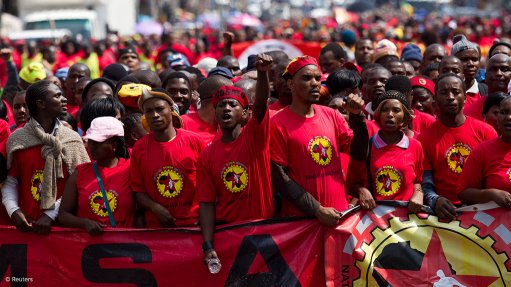
Photo by: Reuters
The National Union of Metalworkers of South Africa (Numsa) said on Tuesday it rejected proposed changes to the country's labour laws which it argued would limit the right to strike.
The government this year intends to implement changes to the Labour Relations Act and the Basic Conditions of Employment Act (BCEA), and implement a national minimum wage bill, setting an amount of R20 per hour.
The department of Labour has been holding public consultations on these proposals and has set January 10 as the deadline for submissions on the changes.
The proposals are in response to numerous strikes which have hit the economy in recent years, as unions press for wage hikes and allowances which companies have often rejected as too steep.
"Together these changes are an attack on the working class and their families because they reduce the hard won rights which workers fought and died for under apartheid," Numsa said in a statement.
Among other concerns, the union said the proposal to hold secret ballots during strikes was "a cleverly disguised way of attacking our constitutional right to strike".
It also rejected the provision for the minister of the labour the power to get a court interdict to suspend a lengthy strike, and said the proposed national minimum wage of R20 per hour would do little to reduce the racial wage gaps, which mostly favour whites, created by decades of apartheid rule.
"Numsa demands a living wage, not just a minimum wage," it said. "A NMW of R20 per hour does not even begin to bridge the unequal wage gap between the African majority and the white minority."
Numsa said it was calling on "all working class formations and structures to reject and fight this assault on the working class".
"The struggle for a dignified living wage, and the battle to defend our rights will not be won in public hearings. It will be won by the working class in action, on the streets, united in its demands."